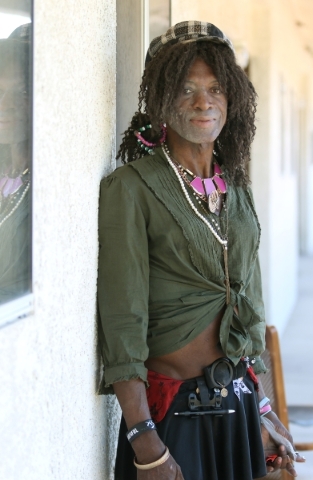Transgender homeless finding more options in Las Vegas
Bouncing around from Denver to Memphis to Las Vegas, Michael Sumling has struggled with homelessness for many years while trying to get his life in order.
At times, being transgender made his options for finding shelter difficult.
But since being at The Salvation Army, he is hoping to get back on his feet.
"The Salvation Army has shown nothing but love for me," Sumling says.
According to the National Center of Transgender Equality, one in five transgender people have experienced homelessness in his or her life.
Marlene Richter, executive director for The Shade Tree shelter, says though Southern Nevada does a count each year to identify how many people are homeless, it's hard to identify the number of transgender people who are homeless. But some organizations have worked to provide resources.
The Salvation Army in Southern Nevada has had its separate emergency shelter to help those who are transgender.
Phillip Hollon, director of social services for The Salvation Army, says about two years ago the Las Vegas branch of the organization started talking about what resources were available.
"We created a personal safety dorm with nine beds," he says. "We don't want any transgender person to be out on the street."
Usually, there are no more than two people in those dorms at a time.
If there is a case where The Salvation Army has one female and one male who are transgender at the same time, Hollon says the organization has a partnership with local hotels and can put one of them up for the evening.
"But we usually only have one or two at a time," he says.
He adds that all people can access any of the resources — from water stations and extreme heat resources to rehabilitation services. The agency doesn't keep track of how many use those services and are transgender.
"It doesn't make a difference how they identify," Hollen says.
The Salvation Army just started its transitional housing to give people shelter for a year while they work on gaining their independence.
"They helped me without being judgmental," Sumling says. "They see the problem and try to help."
Sumling has been in that program a few months after previously being homeless.
What makes The Salvation Army different, he adds, is going beyond emergency shelter and helping people find permanent housing.
Sumling says he didn't care for the way other cities treated people who are transgender.
In Denver, Sumling says the shelter he used automatically put those who are transgender into female quarters without asking their preference or what they are comfortable with.
"It caused a few problems," Sumling recalls.
But now that he is in Las Vegas and in the transitional program, Sumling hopes to be a few months away from having his own place.
"It seems like a dream," Sumling adds.
It's not just making sure the transgender population is included in services. Hollon says the past couple of years they have made sure staff is trained about how to work with people who are transgender, from using respectful language to being open to working with them.
"The closed mindedness has to go," Hollon says.
Juan Salinas, homeless services coordinator for The Salvation Army, says there is a bit of a learning curve.
"It's learning to ask what pronoun they prefer to be called," he says. "Some care and some don't."
Hollon says the problem is letting people know about these services. He is working to get the word out among LGBT organizations.
The Salvation Army isn't the only organization that works with transgender people.
Over at The Shade Tree, Richter says there are resources available.
"It's a little bit easier when dealing with (transgender) children," she says.
For homeless teens who are transgender, or even teens who come in with their mothers looking for shelter, there are living facilities for them.
For the past four years, Richter says they have been able to serve more children who identify as transgender.
"It couldn't matter less if they are," she says. "We just want to make sure they come in and are safe."
Aside from a place to sleep, they also provide counseling services and access to education opportunities.
For transgender women who are adults, The Shade Tree has worked with The Salvation Army to help provide emergency shelter.
"The big problem is our adult women sleeping quarters is one big bay," she says.
The shower area, though, now has curtains for some privacy, but is also in an open room.
"If the person is able to shower and dress in the open bay, then they can stay here," she says.
Richter says if a transgender woman comes in, she can stay at the facility from 6 a.m. to 8 p.m. and then be dropped off at The Salvation Army's private dorm.
"Then, we pick her back up in the morning so we can provide the other services needed," she says.
In the future, she says The Shade Tree would love to have a dorm for transgender women, but that would require massive renovations that would temporarily shut down services.
Additionally, Catholic Charities of Southern Nevada says it accepts everyone into its day and night shelters.
While it does not have separate accommodations for beds, the agency will talk with individuals about making accommodations for use of the showers privately.
Similar to The Salvation Army, Catholic Charities has transitional housing available to everyone who meets the requirements.
Contact reporter Michael Lyle at mlyle@reviewjournal.com or 702-387-5201. Follow @mjlyle on Twitter.


































